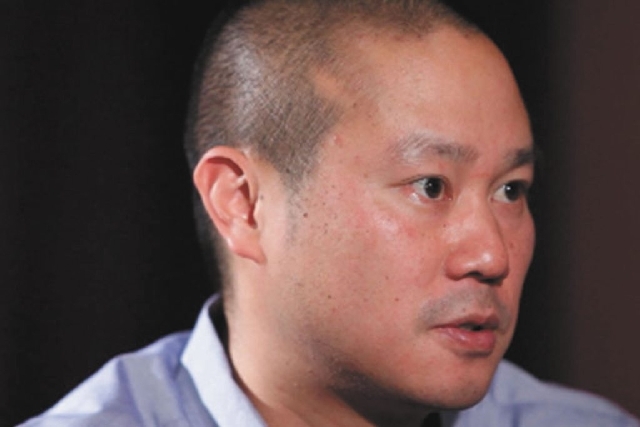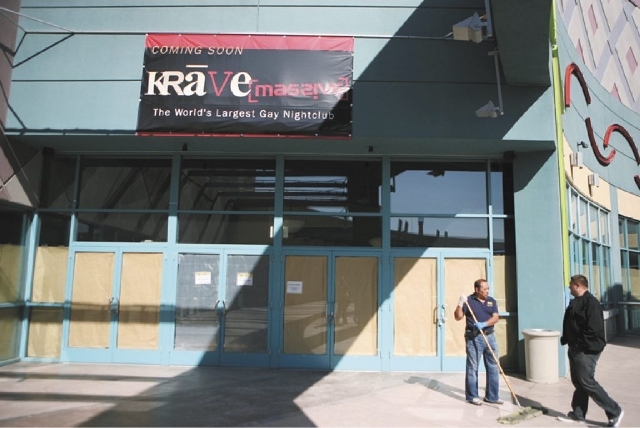Nightclub with troubled past draws Downtown Project’s Hsieh into court battle
Zappos CEO Tony Hsieh might have got more than he bargained for with an investment in Krave Massive, a Las Vegas nightclub with a troubled past.
Phantom Entertainment, the company behind the club, is the defendant in a case in federal court that alleges violations of the Telephone Consumer Protection Act.
The “unlawful, intrusive and abusive telephone calls” and text messages described in the complaint from California residents Kevin Tepper and Daniel Phelps began long before Hsieh’s investment.
But a court filing Monday by Krave operator Kelly Murphy’s attorney, Robert Atkinson, added the Hsieh-backed entity that holds the investment to the list of parties with “direct, pecuniary interest” in the outcome of the case. The entity, FatMD IG. LLC, goes through two intermediary companies before it gets to Hsieh, who is the sole listed manager with the Nevada secretary of state business registry.
“We are talking about a period of several years here where he would get two or three messages every day,” said Andre Verdun, an attorney for the plaintiffs. “The last time I talked to my client it was still happening.”
Tepper and Phelps filed the complaint March 10 in U.S. District Court in Las Vegas, but the dispute over unwanted marketing messages dates to 2009 when Murphy was co-owner of the former Krave nightclub on the Strip.
Although the messages started while Krave was operating under Krave Entertainment, the lawsuit targets Phantom because it acquired the club assets in a 2010 bankruptcy proceeding and “each was the alter ego for the other” throughout the time frame covered in the lawsuit, the complaint said.
Atkinson did not respond to email and voice messages seeking comment. In a court filing on behalf of Phantom, he denied the allegations in the complaint and asked the court to dismiss the case with prejudice.
In an email, Don Welch, who oversees the small business fund for the Downtown Project, the umbrella organization for a $350 million effort by Hsieh and others aimed at reviving downtown Las Vegas, said Hsieh’s group is not active in day-to-day operations at the club.
“We are a passive investor,” Welch wrote. “Lawsuits, contractors and the overall operating of the business are managed and dealt with by the principal. We cannot comment on the litigation because we have no understanding of what occurred or the merit of the complaint.”
According to the complaint Tepper and Phelps signed up to receive messages when they were living in Las Vegas and wanted updates on events and specials at Krave.
In September 2009, they moved to California and requested their names be removed from the list of marketing message recipients, stating they had gotten hundreds of them, the complaint states.
The number is significant because under the Telephone and Consumer Protection Act, businesses can be liable for $500 for each violation and $1,500 for every willful violation.
In recent years, major cases have resulted in multimillion-dollar costs for companies accused of violating the act.
Last month, Google settled a claim over unwanted messages for $6 million. In May, pizza chain Papa John’s agreed to a $16.5 million settlement for a similar claim, and in January, a Domino’s Pizza franchise company agreed to a $9.75 million settlement, according to news reports.
“It is definitely no joke,” said J. Beckwith Burr, chief privacy officer at telecommunications analysis company Neustar, and an expert on the Telephone and Consumer Protection Act, of potential consequences under the law.
Burr said cases against companies are on the rise, especially when it comes to text messages in part because damages are statutory, which means the amount is prescribed in law not based on perceived harm to plaintiffs.
It’s also because Congress and the courts have continued to take seriously complaints from consumers about intrusive marketing practices.
“There is nothing people like less than saying ‘take me off your list’ and getting more calls,” Burr said.
“You have to be able to handle those requests.”
Krave Massive, which is operating but still incomplete, was pitched as a major score for downtown Las Vegas and the long struggling Neonopolis mall.
In an announcement with heavy fanfare a year ago, Murphy revealed plans for what would reportedly be the largest gay nightclub in the world, an 80,000-square-foot pleasure palace with an outdoor pool, five themed dance rooms and a performing arts venue.
But the project bogged down despite a $50,000 grant from the city to help with renovation costs.
It missed the originally planned New Year’s Eve opening amid accusations from former employees of bounced payroll checks, unpaid contractors and negligent bookkeeping. It finally opened in June.
Contact reporter Benjamin Spillman at bspillman@ reviewjournal.com or 702-383-0285 .


















